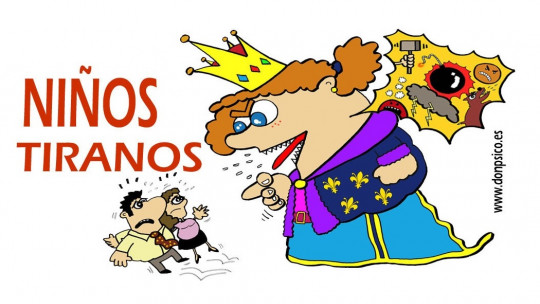People acquire behavioral patterns as we grow. These are not acquired magically: it is necessary for someone to teach them to us in order to assimilate them into our moral code.
Values are necessary so that our children, once they are adults, are socially adapted people and can have happy lives and achieve everything they set their minds to.
We’ll see now a selection of the 15 family values that you can teach your children all of which are essential for raising children who relate healthily to others.
Family values in which to educate your children
In order for them to be well-adjusted in society as adults, children must grow to incorporate ethical norms that help them live together and form their personality. These ethical norms are not acquired solely as a natural consequence of their biological development : Their parents, as main social figures, are the adults who must instill these ethical standards in children. It is, without a doubt, educating our children in values one of the most important strategies in their learning.
However, what exactly do we mean when we talk about “values”? We could define them as those principles that allow us to guide our behavior with the objective of realizing ourselves as people, that guide us to formulate and fulfill goals and purposes, both at an individual and social level.
Values are not taught by saying what they are, but by behaving consistently with them, that is, Parents must be models of these ethical standards so that their children can learn them It is much more important to teach by doing than by saying and, therefore, parents must show them in every situation that is an opportunity to put them into practice.
Although we could mention hundreds of values that the little ones should acquire, here we are going to discover the 15 most important family values that you can teach your children, which every home should make no effort to ensure that the little ones in the home end up acquiring them.
1. Responsibility
Responsibility is one of the most important values that children should learn from a very young age. It involves becoming aware that your actions will have consequences, both good and bad, and that is why you must take responsibility for your actions
A good way to transmit this value is for parents to fulfill their obligations, with what is expected of them, in addition to having their children participate in such tasks.
Responsibility is also taught through punishment, as long as it is necessary and there is no other option. If the child has not completed a task or something that she had promised to do, to learn that her actions have consequences, it will be necessary to apply some type of penalty.
2. Generosity
Every father, brother, uncle or relative who has a child in their family knows that the little ones tend to be selfish. They don’t want to share their toys, they don’t let her mother pay attention to her other little brothers, they don’t want to give the bag of candy to her cousin… There are many situations in which her childish selfishness manifests itself. It’s not their fault, they’re just kids, and a certain lack of generosity is accepted at certain ages
The problem is that if the value of generosity is not instilled in them, sooner or later they will become extremely selfish and self-centered children, who as adults will not care at all about the needs of others nor will they share their things. Teaching to be generous avoids conflicts of all kinds In addition, making children more likely to share without expecting anything in return encourages prosocial behavior, making other children also generous with them and becoming better friends.
3. Commitment
Commitment is a value closely related to responsibility, although it is not exactly the same. We could define it as set goals and try to achieve them in the long term This value is especially useful at an academic level, since the child will do everything possible to get good grades, finish class projects or have good relationships with his classmates if he has made a commitment to his parents.
Commitment is also important in social relationships. It is necessary that in every relationship both parties commit to respecting each other, valuing the other party and giving the best of themselves. Thus, children make a commitment to their friends not to leave them behind if they have a problem, to be there no matter what happens, to attend their birthdays or to invite them to a soccer game. Commitment is a clearly prosocial value.
4. Tolerance
For better or worse our society is globalized. One of the positive aspects of this globalization is the contact of a multitude of ethnicities, cultures and religions who try to live in harmony in the same society. Contact can cause conflict if it is handled poorly, which is why tolerance has become a fundamental value in our times.
Accepting that each person has their own identity, their mother tongue, their culture, their ideas, their sexual orientation, their gender and other totally valid aspects is a way to reduce this possible conflict. In order to create a society without prejudice and in which tensions are not generated by things that we cannot change, it is a social imperative to teach tolerance to the little ones. With it, we make them see that everyone has an identity, and that these identities are equal in rights and respect.
5. Humility
Before starting school, children spend most of the day with their parents or grandparents, receiving all kinds of praise for what they do and don’t do. It is not surprising that in many cases they think that they are the best, that no one else can compare with them. However, As soon as they start kindergarten or school, they discover that there are more children like them in this world , and that they have also been told that they are the best. Their bubble, in which they believed they were the best, has just burst.
This generates a certain conflict, one could even say that they go through a small identity crisis, although it is resolved relatively quickly. Parents must teach their children that they have their good things and their bad things, that no one is perfect and that they must be humble. Each one has its strengths and also weaknesses. You have to be proud of what you excel at, and try to improve what is necessary. You also have to know how to see the good in others, and value it.
6. Gratitude
Things, whether material or not, are not free. Everything has a cost, both in economic terms and in time and effort A parent’s love is a true investment of many resources and children must know how to value it and be grateful for it. They should appreciate the efforts of others so that they have everything they have, in the same way that both adults and other children should thank them for the good things they do for them.
The best way to teach the value of gratitude at home is for parents and older siblings to put it into practice. There are many small gestures and actions that can be done to show gratitude such as thanking whoever made the meal, giving your mother a massage after work, cleaning the house as a thank you for having gone shopping…
7. Honesty
Honesty or sincerity is one of the most essential values in our society. It is closely related to humility, although sincerity is telling the truth, not lying or changing the facts as they are. Without honesty, no person can mature or understand that no one is perfect, just as happens with humility.
Although it will end up being a value learned over time, it is not unusual to find adults who do not internalize it very much. This is why it is so important that parents are responsible for teaching this to the little ones, explaining to them why lying is wrong because not only does it harm others, but it also They themselves risk being harmed by the effect of their own lies
8. Empathy
Each one has their own feelings, desires, needs and goals to fulfill, a fundamental idea that, if not assimilated, will not allow us to live together in a society. Empathy is a value that must be acquired in order to understand this reality, learning that we should not do things to others that we ourselves would not like to be done to us.
Although it is true that empathy develops as one grows, it is necessary for the child’s closest environment to encourage it Parents can demonstrate this by paying attention to their children when they are sad or angry, asking them what is happening to them, and showing interest in their well-being. Thus, children will see that their parents listen to them and, over time, they will develop the skill of active listening, essential for the development of good empathy.
9. Self-esteem
Humility is a fundamental value, which teaches us that socially we are not the most perfect or the best in the world.
However, It is one thing to understand that we are not the best at everything and another is for us to think that we do not deserve respect nor do we value ourselves This is why, to prevent children from falling into this unpleasant extreme, they are taught the value of self-esteem.
Children must learn to value themselves and not allow anyone to walk all over them. This value serves to educate empathy, learning what they do not like being done to them and what they should not consent to under any context that is done to them.
Praise is a good tool to promote self-esteem, as long as it is used appropriately Praise should not be abused, only used when the child has done something extraordinary or very good, such as getting a grade, sharing with others, washing the dishes…
10. Friendship
Friendship is essential at any age, but critical in early childhood. A child who has not made good friends since kindergarten or early elementary school may be a child who ends up living in isolation when he or she grows up, especially in adolescence
Having friends is essential to be able to relate properly, in addition to having more support than family.
Friendship can only be developed as a value in person, or at least by having continued contact with other people. It is not limited to adding a friend on Facebook or Instagram, but it is about sharing experiences, giving support and being supported, inviting birthdays, sharing and feeling that another human being values us. Whoever has a good friend has a treasure.
11. Optimism
Life is not a bed of roses, but looking at it with good eyes can help us overcome it properly Teaching the little ones to live with enthusiasm and optimism, always trying to look for the positive side of things and overcome setbacks is a fundamental value for their development.
Optimism is the fuel that fuels self-improvement, self-esteem, happiness and success. It is what teaches us that there will not always be good times, but that they will always end up being overcome and that by putting effort and a good face into difficulties we can overcome them faster.
12. Patience
Patience is, perhaps, the most difficult value to teach children. As children they must learn to defer gratifications, to understand that it is not possible to have everything at once and that on many occasions they will have to wait a little to get their long-awaited prize. This can be perfected with the classic marshmallow experiment, although it can also be taught by explaining that if they are patient they will achieve more than they originally planned.
For example, if our child wants to play video games all weekend, we can tell him that he will only be able to do it if he puts aside the console during the week and starts studying. If he makes it, we will allow him to spend as much time as he wants with his games come Saturday, if not, the time will be limited. This way the child will learn to control his desire to play, learning that it is better to wait and get the big prize instead of getting small immediate satisfactions
13. Effort
In times when immediacy and ease are most in demand, it seems that the culture of effort is becoming extinct. The striving will be fading, but the demand for striving will not. Effort will continue to be a necessary value to be successful in life.
This is why we must instill in our children the culture of effort, learn that things will not be achieved by simply sitting in a chair and waiting for opportunities to fall from the sky If they want to learn a language, master a sport or know how to play an instrument, they will have to work hard and spend many hours practicing. They should ignore slogans widely seen on the networks such as “learn to play the guitar in a week, effortlessly!” Surprise: they don’t work.
14. Character
It may surprise us to say that character is a value Character is something that many believe is immutable and static, the same throughout a child’s entire life. The belief is widespread that it is something with which we have to conform from birth: if it is good, it is very good and if it is bad, then it is felt. Personality and character can change, and with them the values and belief system.
Obviously, children are not blank slates. They have a personality, a character that takes characteristics from their father and mother. Education is the environmental variable that allows us to shape who a person is, and that is why it is so important. By teaching habits, repeating them, evaluating them and seeing how well they are doing, we can strengthen the character of the little ones.
15. Happiness
Happiness is the value and feeling that should be fostered in every child. After all, every good father wants his children to be happy. Happiness should not be understood as synonymous with joy at all hours , but to be satisfied with being who we are, with what we have, with everything we have achieved in our lives. That is, it is a value that feeds and, at the same time, is fed by the other values that we have explained.
Happiness is the consequence of having been putting our efforts into a project, having committed to it, having been patient and never giving up, always putting on a good face. It is the consequence of having a good system of values, of applying them in our daily lives.









